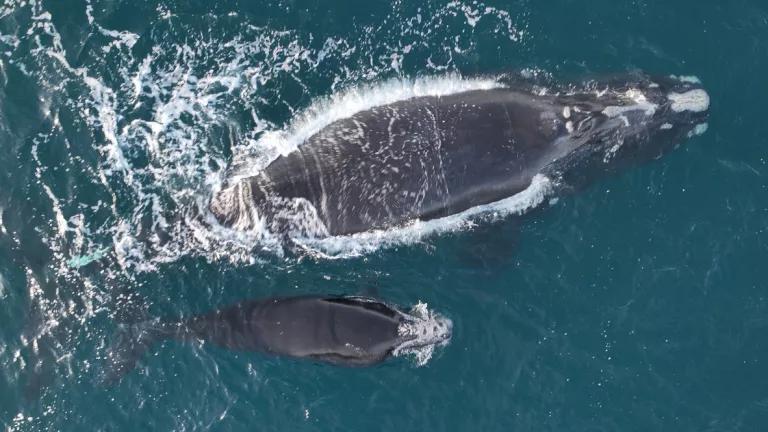Environmental Groups Oppose Harmful Right Whale Vessel Strike Bills
New legislation threatens the survival of the North Atlantic right whale and undermines our bedrock conservation laws.

North Atlantic right whale #3230 "Infinity" and her calf were struck off the coast of Florida in February 2021. Her calf pictured above died from the strike. “Infinity” was spotted several days later with injuries suggestive of a vessel strike.
Florida Fish and Wildlife Commission. All photos taken under NOAA permit 18786
More than 45 environmental groups are sounding the alarm about two bills, now pending in Congress, that would tie the government’s hands in saving the iconic North Atlantic right whale from extinction.
Senators Joe Manchin (D-WV) and John Boozman (R-AR), and Representative Earl L. “Buddy” Carter (R-GA), have introduced bills in the Senate (S.1833) and the House (H.R.4323) that would prohibit NOAA from amending its 2008 right whale ship strike rule. The rule prevents deaths of this desperately endangered species resulting from collisions with large ships, by having vessels slow down in the whales’ habitat. But the rule isn’t perfect, and right whales—including mothers and calves—continue to be struck at rates that aren’t sustainable. The two new bills would thwart efforts to strengthen the rule with science-supported measures that NOAA scientists say are necessary to keep the species from extinction.
NOAA is proposing to amend the rule to cover broader geographic areas and times (mainly the fall and winter) when North Atlantic right whales are known to be most at risk, and to apply the rule to vessels 35 feet in length or greater. These changes are necessary because climate change has caused right whales to shift their habitat-use into areas and times of year not protected by the current rule, and because smaller vessels are known to have been responsible for several deadly strikes. But the bills hitch any changes on NOAA’s full development and deployment of a whale monitoring program—a program that Congress hasn’t funded, will take years to develop, and would need to be proven to work as well as or better than vessel slow downs for NOAA to consider amending its regulations to reflect technological progress.
Today, more than 45 environmental groups, including conservation organizations ranged all along the whales’ east-coast habitat, from Florida to Maine, issued a fact sheet that calls out the two bills for what they are: misleading anti-wildlife legislation that would prevent action necessary to save the whale. In no uncertain terms, the bills would:
Undermine our nation’s bedrock wildlife protection laws. NOAA is required to protect North Atlantic right whales by the Endangered Species Act and Marine Mammal Protection Act. The bills prevent NOAA from issuing amended regulations as required by law and supported by the best available science. This move is yet another worrying example of how Congress is using legislation to circumvent the regulatory process, at the expense of some of our most endangered species.
Threaten the existence of the North Atlantic right whale. North Atlantic right whales may be effectively extinct by 2035, absent urgent action to reduce human-caused deaths and injuries from vessel strikes and entanglements in fishing gear. Vessel strikes are occurring in much greater numbers than the species can withstand. Fourteen documented deaths and fatal injuries from vessel strikes have occurred in United States and Canadian waters since 2017—six of those in the United States—and two more right whales are known to have been struck and injured in U.S. waters. The actual number of strikes is likely far higher as the majority of strikes go undetected. Amended regulations to reduce vessel strikes are necessary to help ensure the species’ survival.
Mislead Congress and the public on the availability of technological solutions to mitigate vessel strike risk. The only proven way to reduce the risk of a lethal vessel strike is to reduce the speed of a vessel to 10 knots or less. While there are currently a range of technologies in development to track whales and alert boaters, and some are being tested and used, no technologies or mitigation protocols have been proven effective in reducing the risk of a single vessel strike on the water in real time. North Atlantic right whales do not have time to wait to determine whether it is possible to develop these types of measures. Amended regulations that apply the 10-knot speed restriction more widely are urgently needed to prevent further vessel strike deaths. Once technologies are proven to work, regulations can be amended to reflect that progress.
Risk vessel safety by not implementing rules that would reduce the likelihood of vessel strikes. The proposed amendments to the vessel strike risk reduction rule would reduce the likelihood of a strike and improve vessel safety. In February 2021, a sport fishing vessel accidentally struck a right whale mother and calf, killing the calf and seriously injuring the mother. The vessel was damaged beyond repair, resulting in a $1.2 million total loss. The vessel strike risk reduction rule does not create additional safety concerns for vessels. Both the current vessel strike risk reduction rule and the proposed amendments include the ability to deviate from the rules for safety reasons. State and federal vessels engaged in law enforcement or search and rescue activities, as well as all U.S. Coast Guard and U.S. Navy vessels, are also exempt from the rule.
These bills are rooted in misinformation and hyperbole, jeopardizing not only the North Atlantic right whale but also the laws that protect our nation’s most treasured species. Congress should leave decisions of how to protect right whales to scientists.
For further information:





